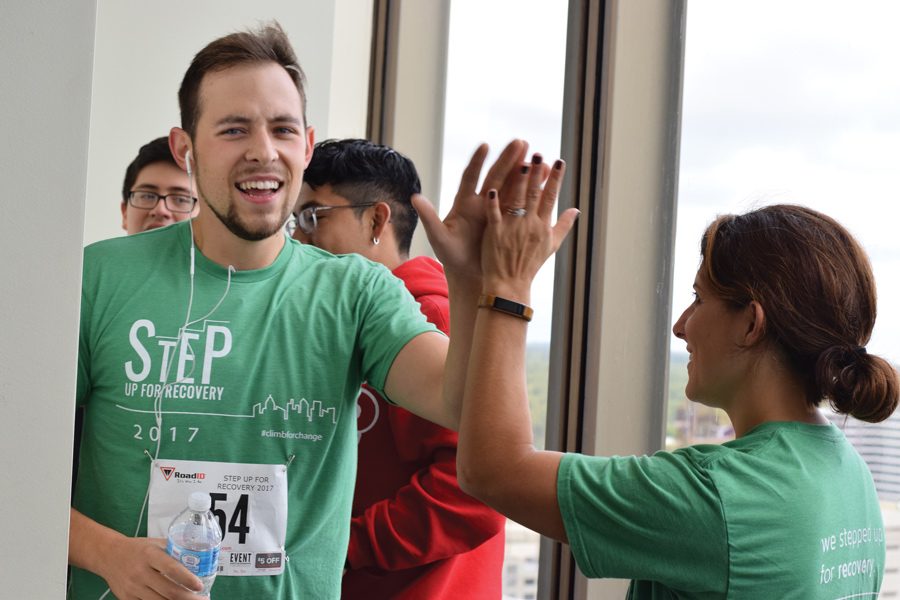Community members climb 20 floors to raise funds for addiction treatment
Carly Rubin/The Daily Northwestern
A Step Up for Recovery participant reaches the finish line on Bank One tower’s 20th story. More than 200 community members engaged in the event, organized by PEER Services, to raise funds for substance abuse treatment.
October 16, 2017
Donning baby blue team shirts in honor of her brother, Cayla Gamble and more than 20 family members and supporters gathered Sunday in Orrington Plaza to climb the Bank One tower’s 20 stories of stairs.
Her brother, Gary Charlton, died from a heroin overdose in February 2015. Since the event’s founding two years ago, Gamble said her family has participated in Step Up for Recovery to keep his memory alive and raise funds to treat people struggling with substance abuse.
“What I and my family are trying to do is just be open about it,” Gamble said. “Be open about how Gary passed away, be open about the treatment and the places out there that people can get help. And if one person hears our story and seeks that help, then it’s all worth it.”
The event was organized by PEER Services — an organization that provides substance abuse treatment in northern Chicago and the north suburbs — to raise funds for its services.
This year, the community raised around $30,000, said Jenny Phan, development director of PEER Services. All funds go toward scholarships that help those who do not have insurance or cannot afford treatment on their own, Phan said.
More than 200 people came to climb or cheer on the participants Sunday, Phan said.
“The climb is very symbolic of the journey of recovery,” she said. “It is very difficult as you keep going and there can be a lot of rough spots along the way, but it is possible to get to the top.”
Board member Joe Alger said PEER Services, unlike many other nonprofit agencies, accepts everyone who comes to its doors, regardless of their ability to pay.
“Seeking treatment and finding a path towards recovery is a good step and sign of strength,” Alger said. “(It’s about) enabling more and more people to be able to walk through their doors and say ‘I need help.’”
Some participants were sponsors from other organizations, including Brian Kirk, who founded the Heroin Epidemic Relief Organization in 2010 with John Roberts after each lost a son to a heroin overdose.
Kirk said addiction is not just a “young person’s problem” because the lack of education on pain medication usage affects all ages.
Some of the biggest barriers to tackle, Gamble said, are the stigma associated with addiction and the lack of treatment centers. According to PEER Services, substance use disorders affect more than 23 million Americans, but only 11 percent of them receive treatment.
“People think these are people who don’t have goals and aren’t doing anything with their life,” Gamble said. “In reality, Gary played baseball year-round, he played golf at high school, he was an honor roll student. It can happen to anyone.”



